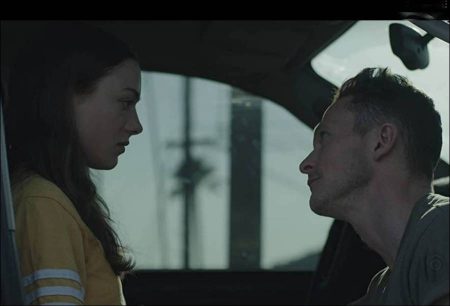Palm Trees and Power Lines opens with scenes of summer, observing 17-year-old Lea (a striking Lily McInerny) drifting through the lazy, humid days before school resumes. She takes long walks humming tunes to herself, sunbathes in her backyard with her friend and watches online make-up tutorials, attempting to achieve the elusively “fresh, dewy, not too much” look.
Lea moves through the world without affect — bored, restless and uninspired by friends and family. She doesn’t respect her mother, Sandra (Gretchen Mol), an anxious realtor who looks to the string of bland men she dates to define and satisfy her. Nor is Lea particularly interested in her peers, who pass their vacation days days lounging on the beach and spend nights smoking and drinking.
Palm Trees and Power Lines is a 2022 American coming of age drama feature film directed by Jamie Dack based on her 2018 short film of the same name. The film stars Gretchen Mol, Jonathan Tucker and Lily McInerney as a seventeen-year-old who has a life changing encounter with a man twice her age. It premiered at the 2022 Sundance Film Festival on January 24, 2022, where Dack won the award for Directing, Editing and Screenwriting in the U.S. Dramatic Competition.
Film Review for Palm Trees and Power Lines
Written by Dack and Audrey Findlay, this is a story that could take place more or less anytime, anywhere, centering on teenagers who have nothing to do except lie around a pool, go to the mall or get into trouble, most of the time innocuously. Specifically, this is looking like wasted summer for Lea (Lily McInerny), a 17-year-old who lives in some anonymous and thoroughly banal Southern California neighborhood with her mom Sandra (Gretchen Mol), who’s just broken up with her latest beau.
It’s an unimpressive group of no-accounts that Lea hangs around with—the boys consider it hilarious to take the girls out to a diner and then run off without paying, and it’s almost painful to observe their stupid behavior. In a bit, the story picks up with a scene that closely resembles the opening of the short: a good-looking dude drives up alongside her and chats her up. After some flattery and cajoling on his part — and Lea jokily saying “Don’t murder me” — she agrees to accept a lift.
The man in question is Tom (Jonathan Tucker). He speaks sympathetically and supportively, listens to her and consolingly advises that, “You should be hanging out with people who are much more on your level.” One significant difference between the short and this feature adaptation is that, originally, the pick-up artist looked to be perhaps in his mid-20s, while Tom admits to being 34, exactly twice Lea’s age.
If the writers jacked up the guy’s age to increase the creepiness factor, they have succeeded, even though Tucker brings a likability factor that, all the same, can’t conceal (to the viewer, anyway) that this guy almost certainly represents trouble. But having absolutely nothing else going on in her life, Lea is open to options.
As Glenn the dentist will be coming over to see Mom the next day, Lea wants to be out of the apartment, and Tom is keen to oblige. Even if you haven’t seen the short film, the feature sets off enough suspicious vibes to convince you that the guy has something other than purely honorable intentions where this teenager is concerned.
When they next get together, Tom tells Lea that he runs his own small business and that “I live my life any way I want.” The guy does have an incredible physique, but also looks to be prematurely graying. When he very properly asks her if she wants to come back to his room, she assents. The next morning they both seem happy.
The sexual politics are certainly different, but the preponderance of vehicles, motels and arid landscapes, the laconic manner of speaking and the mobile camera all remind of road movies of the late ‘60s and early ‘70s, albeit without the rebellious, searching-for-something mind-set. And that’s a very big difference — the characters here can’t even articulate what they’re looking for, if anything, much less go about finding it.
No matter how polite and encouraging Tom may be to Lea, you know he’s up to no good. The storm clouds gather, as it were, but Lea just can’t see them even when Tom mentions that he has a “friend” coming over. A waitress even tries to tip Lea off about how Tom is always there with other girls, but Lea is so needy of affection and attention that she agrees to go off with him to a beach hotel for a few days. “I want to be the one to take care of you from now on,” he says. This may sound fine to naïve Lea, but to the viewer it’s a scarcely veiled threat.
The payoff one has feared and that Tom ultimately confers upon Lea, is painful and not easy to watch. It’s a life lesson that shouldn’t have to have been learned this way, and Dack doesn’t put any artificial spin on it to alleviate the nasty degradation of it all.
But in her unemphatic narrative manner, Dack chronicles an experience that may have given the victim of this crime a human and experiential awakening that will make her stronger and bolder in future, which is at least one way one can interpret the ending. Now that she’s told this story twice, in different ways and in varying detail, she should be ready to move on to a new canvas.
Palm Trees and Power Lines (2022)
Directed by: Jamie Dack
Starring: Lily McInerny, Gretchen Mol, Emily Jackson, Quinn Frankel, Armani Jackson, Ping Wu, Timothy Taratchila, Rhied De Castro, onathan Tucker, Yolanda Corrales, ily Collias
Screenplay by: Jamie Dack, Audrey Findlay
Production Design by: Yu-Hsuan Chen
Cinematography by: Chananun Chotrungroj
Film Editing by: Christopher Radcliff
Costume Design by: Kelsey Charter, Aaron Crosby
Art Direction by: Shi Min Yong
MPAA Rating: None.
Distributed by: IndieClear
Release Date: January 24, 2022
Visits: 6





